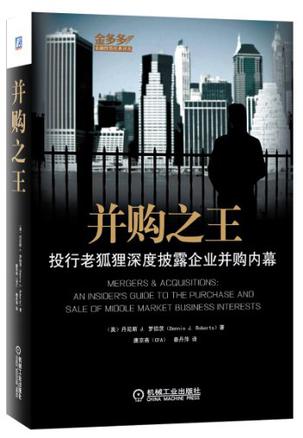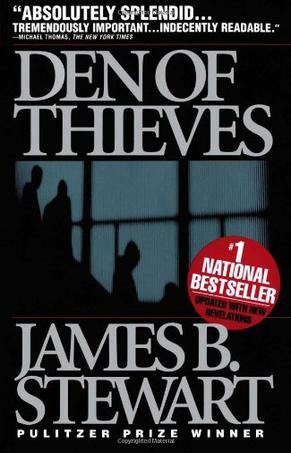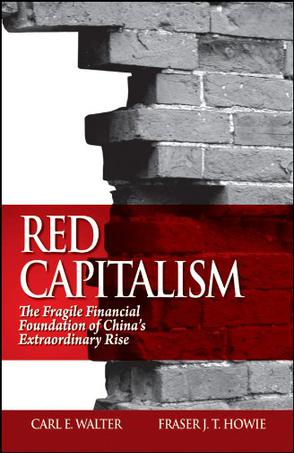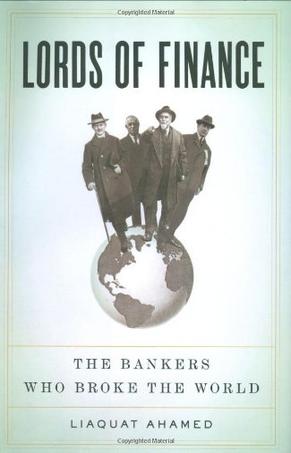-

并购之王
《并购之王》不仅是写给中型企业的所有者和管理者的,也是从事中型企业兼并与收购业务的投资银行家和财务顾问的必读教科书。 《并购之王》不但探讨了中型企业兼并与收购工作的科学性和艺术性,更重要的是,对于企业家出售企业时如何获得最大价值这一关键问题,分别从心理和谈判幕后等角度进行了全面揭秘。涉及的主题包括估值、税收、谈判、并购惯例,以及诸多从买方和卖方立场上各自涉及的问题。 《并购之王》是一本专业但又类似并购野史的趣味杂谈,丹尼斯 J. 罗伯茨通过趣闻轶事表达了对于中型市场交易的“感觉”。丹尼斯是一位经验老到的CPA持证人和企业估值专家,是并购投资银行家中具有多年真实并购经验的老手。不但如此,他还培训了数以千计的投资银行顾问,在并购领域是一位广受好评、声名在外的导师。迄今为止,市场上没有一本书能够针对中型市场的企业并购提供如此深刻、独到的视角和见解。 该书被列为CVA注册估值分析师考试扩展推荐阅读教材之一,作为投资分析估值专业人士的拓展读物。注册估值分析师(Chartered Valuation Analyst, CVA)认证考试是由注册估值分析师协会(CVA Institute)组织考核并提供资质认证的一门考试,旨在提高投融资估值领域从业人员的实际分析与操作技能。考试从投融资专业实务及实际估值建模等专业知识和岗位技能进行考核,主要涉及企业价值评估及项目投资决策。 -

Too Big to Fail
A real-life thriller about the most tumultuous period in America’s financial history by an acclaimed New York Times Reporter Andrew Ross Sorkin delivers the first true behind-the-scenes, moment-by-moment account of how the greatest financial crisis since the Great Depression developed into a global tsunami. From inside the corner office at Lehman Brothers to secret meetings in South Korea, and the corridors of Washington, Too Big to Fail is the definitive story of the most powerful men and women in finance and politics grappling with success and failure, ego and greed, and, ultimately, the fate of the world’s economy. “We’ve got to get some foam down on the runway!” a sleepless Timothy Geithner, the then-president of the Federal Reserve of New York, would tell Henry M. Paulson, the Treasury secretary, about the catastrophic crash the world’s financial system would experience. Through unprecedented access to the players involved, Too Big to Fail re-creates all the drama and turmoil, revealing never disclosed details and elucidating how decisions made on Wall Street over the past decade sowed the seeds of the debacle. This true story is not just a look at banks that were “too big to fail,” it is a real-life thriller with a cast of bold-faced names who themselves thought they were too big to fail. -

Den of Thieves
有人认为投资市场的前很容易捞,只要你是「画饼」高手…… 股市大盗以虚设公司、交互持股等方式灌充公司业绩,拉台公司股价,诓骗法人、散户进行投资,再以内线交易出脱持股……本书以小说故事还原新闻原貌,重现华尔街四大天王共谋的数十亿内线交易案内幕。 本书作者荣获 1992 年普立兹奖,经过深入调查与锲而不舍的追踪探问,终于抽丝剥茧地,揭露了华尔街有史以来的最大宗内线交易的丑闻案,并一举起出由四大天王共谋的数十亿 违约交割的经过,卒令邪不胜正,应验了中国人的智慧警语:天网恢恢,疏而不漏。情节紧凑,剧力万钧,引人入胜,是一本读罢依然令你不舍得搁手的好书。 -

All the Devils Are Here
As soon as the financial crisis erupted, the finger-pointing began. Should the blame fall on Wall Street, Main Street, or Pennsylvania Avenue? On greedy traders, misguided regulators, sleazy subprime companies, cowardly legislators, or clueless home buyers? According to Bethany McLean and Joe Nocera, two of America's most acclaimed business journalists, the real answer is all of the above-and more. Many devils helped bring hell to the economy. And the full story, in all of its complexity and detail, is like the legend of the blind men and the elephant. Almost everyone has missed the big picture. Almost no one has put all the pieces together. All the Devils Are Here goes back several decades to weave the hidden history of the financial crisis in a way no previous book has done. It explores the motivations of everyone from famous CEOs, cabinet secretaries, and politicians to anonymous lenders, borrowers, analysts, and Wall Street traders. It delves into the powerful American mythology of homeownership. And it proves that the crisis ultimately wasn't about finance at all; it was about human nature. -

Red Capitalism
For many years now China's economy has seemed unstoppable. A slow appreciation of the renminbi in 2007 brought wave upon wave of liquidity into China and allowed its companies and banks to raise hundreds of billions in dollars via stock market listings. State banks that had started the new century as bankrupt relics of a communist past became the darlings of international investors. Even the collapse of Lehman Brothers in 2008 and the ensuing global financial crisis seemed to have little impact on China as the government quickly responded with a huge stimulus package. But the Lehman collapse was a dramatic wake up call to the Chinese leadership. This model of bank and capital market reform had been studiously emulated for more than a decade and had brought great benefits to China. But now, although they believed it to be bankrupt, the Chinese government were bereft of new ideas. In the face of the global financial crisis the government returned to what it knows best, massive state intervention via the banking system. Ten years of banking and capital market reforms were dead. In Red Capitalism, Carl Walter and Fraser Howie detail how the Chinese government reformed and modeled its financial system in the 30 years since it began its policy of engagement with the west. Instead of a stable series of policies producing steady growth, China's financial sector has boomed and gone bust with regularity in each decade. The latest decade is little different. Chinese banks have become objects of political struggle while they totter under balance sheets bloated by the excessive state-directed lending and bond issuance of 2009. Looking forward, the government's response to the global financial crisis has created a banking system the stability of which can be maintained only behind the walls of a non-convertible currency, a myriad of off-balance sheet arrangements with non-public state entities and the strong support of its best borrowers--the politically potent National Champions--who are the greatest beneficiaries of the financial status quo. China's financial system is not a model for the west and, indeed, is not a sustainable arrangement for China itself as it seeks increasingly to assert its influence internationally. This is not a story of impending collapse, but of frustrated reforms that suggests that any full opening and meaningful reform of the financial sector is not, indeed cannot be, on the government's agenda anytime soon. -

Lords of Finance
As the global economy is racked by its worst crisis since the Great Depression, there is a renewed interest in the lessons to be learned from the world economic collapse of the late 1920s. Drawing on his best-selling book, Lords of Finance: The Bankers Who Broke the World, noted author Liaquat Ahamed discusses the insights we can gain from the Great Depression about the forces that cause global financial crises, the similarities between the breaks down in the 1920s and the current meltdown and the actions economic officials need to take in order to reverse the downward spiral in the world economy and avoid a repeat of that cataclysm.